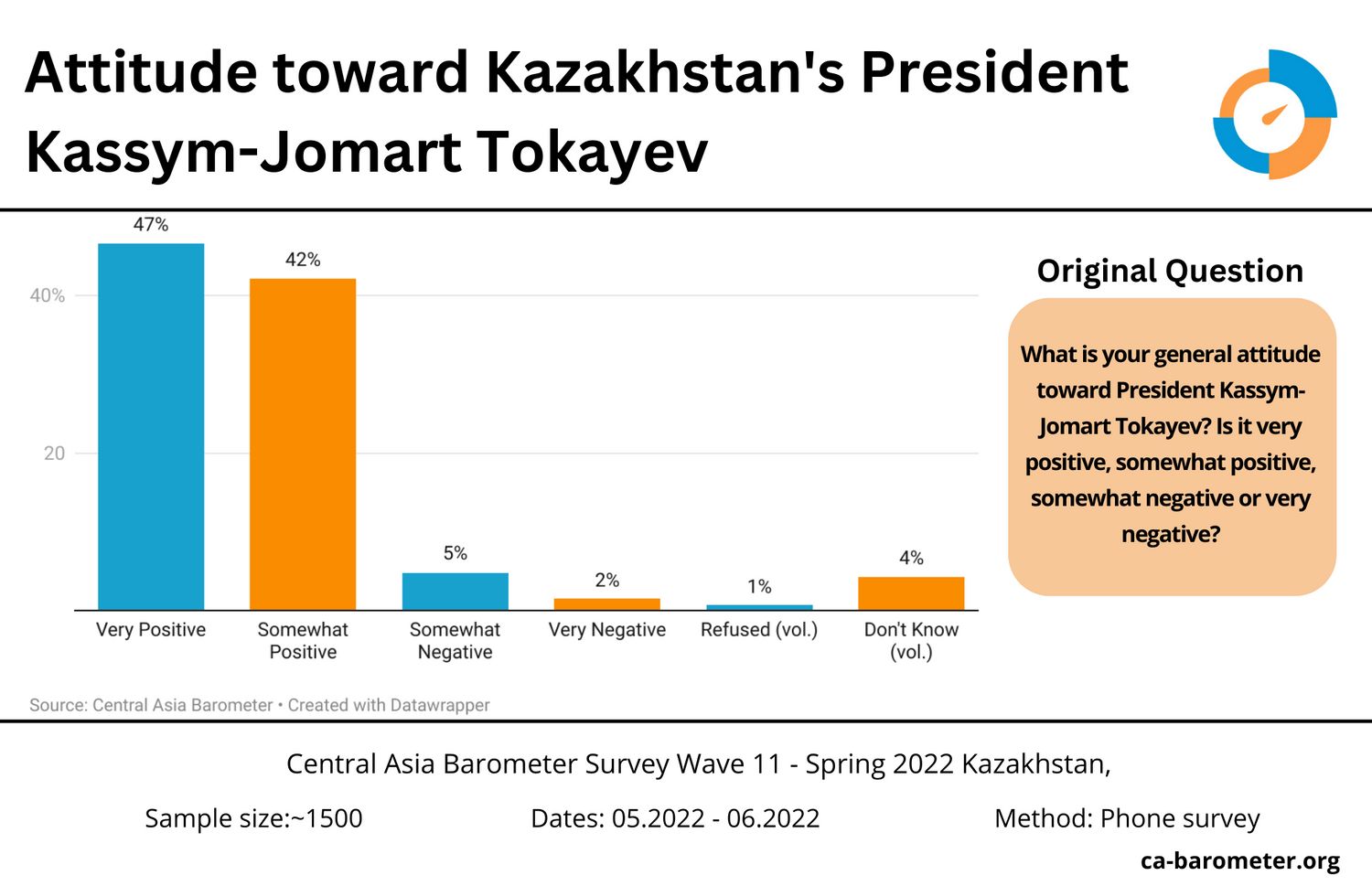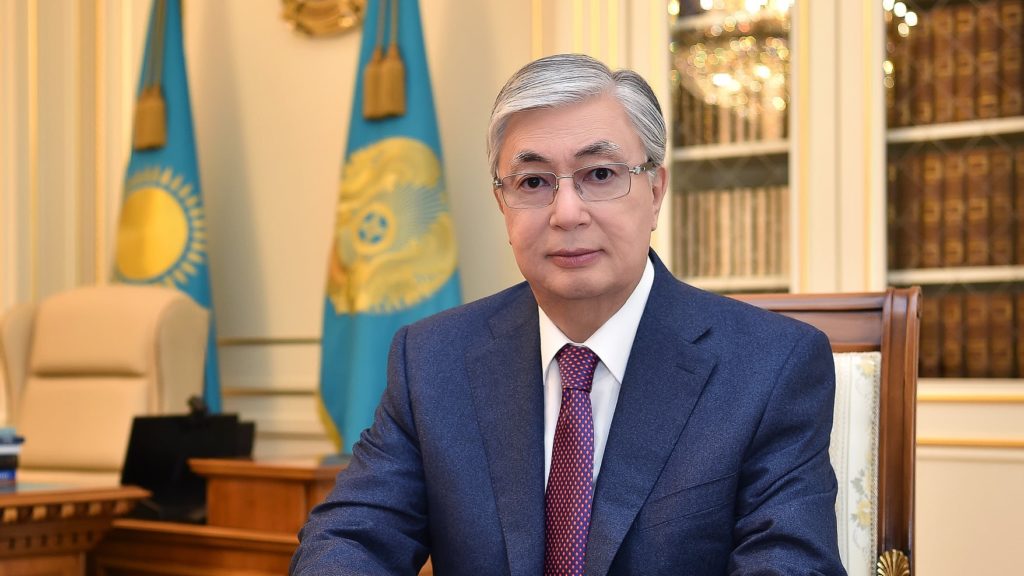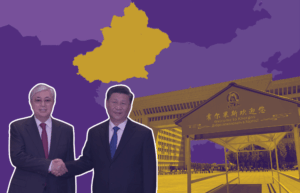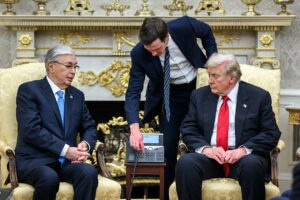The counting is over: the final results of Sunday’s snap election were announced on Tuesday. According to the Central Election Commission, the current President of Kazakhstan, Kassym-Jomart Tokayev, has won 81.31% of votes and therefore stays in office for the next seven years. The inauguration is planned for the 26 November. The final election results are fully in line with the preliminary results announced the day before. As many as 460 484 voters – or 5.8% – voted “against all” candidates. The rest were divided between the bleak alternatives: 3.42% voted for Zhiguli Dairabayev, 2.6% for Karakat Abden, 2.53% for Meiram Kazhiken, 2.22% for Nurlan Auesbayev, and 2.12% for Saltanat Tursynbekova. The voter turnout was 69.44%.
The data from Central Asia Barometer, a regional non-profit centre for applied social research, supports the numbers. The spring Survey shows the majority of citizens having a positive general attitude towards Kassym-Jomart Tokayev.

Zhas Sailaushilar Ligasi (The League of Young Voters), a grassroot initiative that conducts election observation, also provides similar numbers. Although the data from their 83 polling stations cannot be extrapolated on the whole population, the observed tendency is similar: according to their counting, Kassym-Jomart Tokayev won 86.33% of votes. The election turnout, however, is different: ZSL data shows only 44%. However, the elections themselves can hardly be called flawless: the ODIHR’s Election Observation Mission (EOM) assessed counting negatively in more than half of the polling stations observed “due to substantial procedural errors and omissions, raising serious questions about whether ballots were counted and reported honestly.” In addition, the EOM stated that “the eligibility requirements for presidential candidates are overly restrictive, unreasonably limiting the constitutionally guaranteed right of citizens to stand for elections.” Irina Mednikova, the coordinatior of Zhas Sailaushilar Ligasi (ZSL), supports this notion. “This observation was no different from previous ones: observers faced restrictions on their movement around the polling station, refusals to provide data, and psychological pressure. – explains Mednikova. – Five observers were removed from polling stations by commissions by the end of the day, and four more stopped responding. One of our observers in Astana was removed from the station by the police.” ZSL started with 100 polling stations in 16 cities, mostly in Almaty, and at the end of the day had 83 people counting the ballots. “For the sake of fairness it should be noted that every year we have some model polling stations, where the commissions know the law, consult with the observer and also correct deficiencies after observer’s notions. – continues Mednikova. – But there are also those where the chairman openly bullies the observer, turns other observers against him, calls the police or the prosecutor’s office and asks to deal with the observer – there are usually 3-5 such stations. This year we had a situation when to the phrase: ‘There is law’ the chairman replied: ‘I am the law’.” The snap election was announced earlier this autumn. During the State-of-the-Nation Address on 1 September, Kassym-Jomart Tokayev proposed several constitutional changes, including the extension of the presidential term from 5 to 7 years with no right of re-election. This is a part of Tokayev’s “New Kazakhstan”, a reform package which was announced after the events of Bloody January. These reforms included renaming the capital city back to Astana and stripping Tokayev’s predecessor Nursultan Nazarbayev of lifetime benefits and key positions. “New Kazakhstan” was widely criticized as a governmental attempt to shift the focus from the January unrest that left at least 238 people dead (including 6 tortured to death) and around 70 missing. Back then Kassym-Jomart Tokayev stated that the city of Almaty was being attacked by 20,000 well-trained terrorists, allowed special forces to use lethal weapons without warning, and requested help from the Collective Security Treaty Organization (CSTO). So far, the “New Kazakhstan” suspiciously resembles the old one – with no freedom of assembly, attacks on free press, and pressuring activists and opposition leaders. On the day of the elections, activists from the “Oyan, Qazaqstan!” (Wake Up, Kazakhstan!) movement were detained by the police. Several people went out to the main square with a banner that read “Will we live to see fair elections?” They were taken away in under ten minutes and released a few hours later. Youth Information Service of Kazakhstan, an NGO with a focus on human rights, reported on several cases of pressure and hacking attempts against independent journalists before the elections. Meanwhile, Zhanbolat Mamay, the leader of an unregistered opposition party, the Democratic Party of Kazakhstan, has been under arrest for eight months, during which the charges against him have changed several times.
Written by Anna Wilhelmi
Edited by Emma Bain
For more news and analysis from Central Asia, follow us on Twitter, Facebook, Telegram, Linkedin or Instagram.
 Tokayev’s new term: Central Election Commission announces final results of Kazakh presidential election
Tokayev’s new term: Central Election Commission announces final results of Kazakh presidential election 



